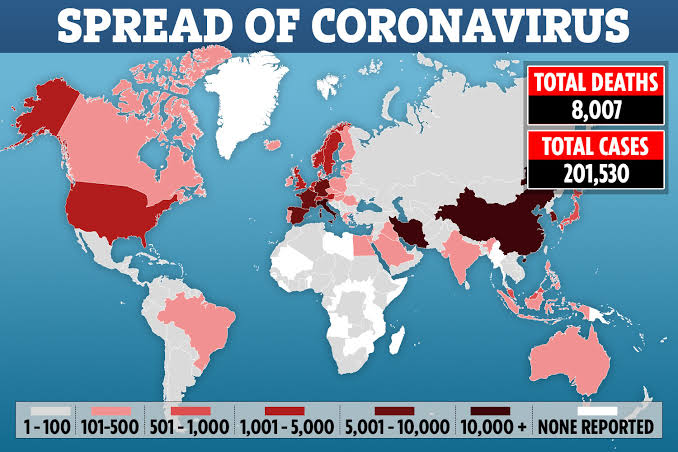The World Health Organisation (WHO) says no fewer than 200,000 cases of Coronavirus ( COVID-19) have now been reported to WHO and 8,000 people have lost their lives.
SEE ALSO: This is how $22.7 billion loan will be used – Senate Reveals
Dr Tedros Adhanom Ghebreyesus, WHO Director-General, gave the update on the agency’s website.
According to him, more than 80 per cent of all cases are from two regions – the Western Pacific and Europe.
“We know that many countries now face escalating epidemics and are feeling overwhelmed.
“We hear you. We know the tremendous difficulties you face and the enormous burden you are under. We understand the heart-wrenching choices you are having to make.
“We understand that different countries and communities are in different situations, with different levels of transmission.’’
The director general said that WHO was talking to ministers of health, heads of state, health workers, hospital managers, industry leaders, CEOs and more every day.
“WHO was talking to the stakeholders to help them prepare and prioritise, according to their specific situation.
“Don’t assume your community won’t be affected. Prepare as if it will be; don’t assume you won’t be infected. Prepare as if you will be.
“But there is hope. There are many things all countries can do.
“Physical distancing measures – like cancelling sporting events, concerts and other large gatherings – can help to slow transmission of the virus.
“They can reduce the burden on the health system; they can help to make epidemics manageable, allowing targeted and focused measures,’’ he said.
In addition, he director general suppress and control epidemics, countries must isolate, test, treat and trace.
“If they don’t, transmission chains can continue at a low level then resurge once physical distancing measures are lifted.
“WHO continues to recommend that isolating, testing and treating every suspected case, and tracing every contact, must be the backbone of the response in every country.
“This is the best hope of preventing widespread community transmission.
“Most countries with sporadic cases or clusters of cases are still in the position to do this.
“Many countries are listening to our call and finding solutions to increase their ability to implement the full package of measures that have turned the tide in several countries,’’ he said.
Also, Ghebreyesus said some countries were experiencing intense epidemics with extensive community transmission, saying, “we understand the effort required to suppress transmission in these situations. But it can be done.’’
The director general, however, thanked some countries for joining solidarity trial, which would provide simplified procedures to enable even hospitals that have been overloaded to participate.
He said many countries had already confirmed that they will join the SOLIDARITY trial – Argentina, Bahrain, Canada, France, Iran, Norway, South Africa, Spain, Switzerland and Thailand – and I trust many more will join.
“I continue to be inspired by the many demonstrations of solidarity from all over the world.
“The COVID-19 Solidarity Response Fund has now raised more than US$43 million from more than 173,000 individuals and organizations.
“ A few days since we launched it. I’d especially like to thank FIFA for its contribution of US$10 million.
“These and other efforts give me hope that together, we can and will prevail.
“This virus is presenting us with an unprecedented threat. But it is also an unprecedented opportunity to come together as one against a common enemy – an enemy against humanity,’’ the director general said.

